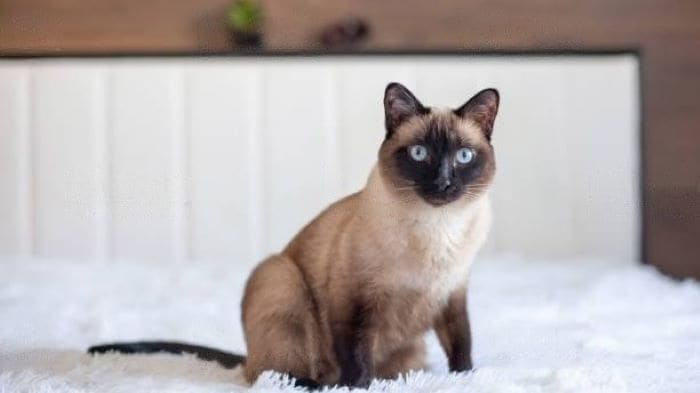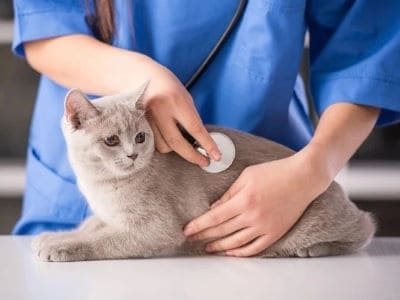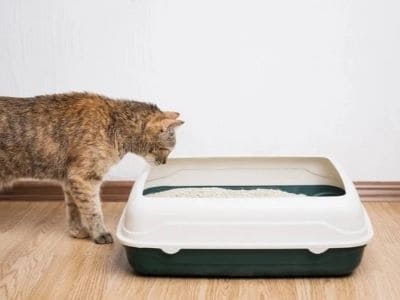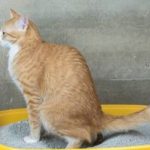We’ve all been there – you wake up in the morning, groggy and bleary-eyed, only to be greeted by the sight and smell of cat poop in your bed. It’s a feeling that can only be described as sheer horror, followed by a healthy dose of anger.

But why did your cat poop in your bed? There could be a few reasons. In this article, we’ll explore some of the most common reasons cats poop in their humans’ beds, and what you can do to prevent it from happening again.
Contents
Possible Causes for a Cat Pooping on a Bed
There could be a few reasons why your cat has decided to poop in your bed. Maybe your cat feels comfortable and safe in your bed and sees it as their personal space.
Or, perhaps your cat is trying to tell you something and pooping in your bed is their way of getting your attention. Another possibility is that your cat simply doesn’t have access to a litter box, or they don’t like the litter you’re using.
Whatever the reason may be, it’s important to try and figure out why your cat is pooping in your bed, so you can remedy the situation.
Medical Issues:
The first thing you should consider is whether there is an underlying medical issue causing your cat to poop on the bed. Lorie Huston from PetMD states that “cat pooping anywhere outside the litter box may indicate medical or behavioral issues“.

Sometimes cats do so because they have difficulty controlling their bowels or may have an infection that needs treatment from a vet.
If you suspect something like this might be going on with your cat, then it’s best to take them for a checkup right away!
Stress or Anxiety:
Cats can become stressed out by changes in their environment such as moving house, new people living with them, or even just rearranging furniture around the home.
When stressed out, they may display behaviors such as peeing and pooping on beds, which could signal something more serious than just needing some extra love and attention from their owners!
Catherine Barnette, DVM from VCA Hospitals explains that increased stress can also cause bowel incontinence in cats.
Litter Box Issues:
If your cat has easy access to other places where they might go such as outside the house or other areas inside that are not ideal for use as a toilet, then they may choose those instead of using their litter box correctly.

To stop this behavior, ensure that all litter boxes are clean regularly and placed away from any other potential pooping spots!
Attention-seeking Behavior:
Cats also sometimes poop on beds if they feel like they need more attention from their owners than usual – especially if there is another pet around competing for affection too.
If this seems likely then try spending quality time with your feline friend every day playing games, cuddling up together etc., so that she knows she is loved and appreciated!
How to Stop a Cat from Pooping in a Bed?
According to resources.bestfriends “Sometimes, cats who are incontinent due to injury regain some control of their bladder or bowels.” Once you have identified what could be causing your cat’s inappropriate toileting habits, then it’s time to start working towards stopping them once and for all – here’s how:

- Make sure any medical issues are being treated correctly by visiting veterinary professionals.
- Ensure all litter boxes are kept clean.
- Spend quality time with kitty every day.
- Keep stress levels low by providing comfort items such as scratching posts & toys.
- Discourage off-limit areas like beds through discipline methods (e.g spraying water).
FAQs
Why did my cat start pooping on my bed?
There could be a variety of reasons why your cat started pooping on your bed. Some possible causes include medical issues, stress or anxiety, litter box issues, or attention-seeking behavior.
It is important to identify the cause in order to address the issue effectively.
What should I do if my cat starts pooping on my bed?
- Take your cat to the vet to ensure there is no underlying medical condition that might be causing this behavior
- 2. Make sure you are providing your cat with a clean litter box in an accessible area of your home, and if possible, use a litter they prefer
- Try to limit any stressors or changes in the environment that could be triggering this problem behavior
- Provide positive reinforcement when you catch them using their litter box correctly by giving treats or verbal praise
- Move furniture away from areas where they have been pooping so it becomes less accessible for them
- Use deterrents like aluminum foil around these areas as cats typically don’t like walking on it
Is it normal for a cat to poop on a bed?
No, it is not normal for a cat to poop on a bed. Cats typically use their litter box for eliminating waste, so any deviation from this should be taken seriously and addressed quickly.
If your cat is pooping on the bed, it may indicate an underlying medical issue or behavioral problem that needs to be addressed by your veterinarian.
Can a cat’s diet affect its tendency to poop on a bed?
Yes, a cat’s diet can affect its tendency to poop on a bed. Poor nutrition or an imbalance in vitamins and minerals may lead to digestive problems, which can cause your cat to have difficulty controlling where it eliminates waste.
Additionally, if your cat feels stressed or anxious due to changes in their environment they may express this behavior by pooping outside the litter box.
To reduce the likelihood of this behavior you should make sure that your cat is eating a balanced diet and getting plenty of mental stimulation through playtime and interaction with people or other pets.
Conclusion
In conclusion, cats may poop in their owner’s beds for a variety of reasons. It is important to take the time to figure out why they are doing so and take steps to prevent it from happening again.
If your cat has already pooped in your bed, it is important to clean the area thoroughly with a pet-safe cleaner and keep the bedroom door closed when you are not home.
With some patience and effort, you should be able to successfully train your cat not to poop in your bed.
Reference:
- Does previous use affect litter box appeal in multi-cat households? (n.d.). Retrieved December 20, 2022, from https://doi.org/10.1016/j.beproc.2017.02.008
- Banik, C. (n.d.-a). Simultaneous Chemical and Sensory Analysis of Domestic Cat Urine and Feces with Headspace Solid-Phase Microextraction and GC-MS-Olfactometry. MDPI. https://doi.org/10.3390/separations8020015
- Feline Behavior Problems: House Soiling. (2018, July 23). Cornell University College of Veterinary Medicine. https://www.vet.cornell.edu/departments-centers-and-institutes/cornell-feline-health-center/health-information/feline-health-topics/feline-behavior-problems-house-soiling
Charlene Pare is the founder of Cat Likes Best. She manages and strategizes the content published on this website. When she isn’t working, she enjoys exploring the city around with her Ameican Shorthair kitty–Moli. Being a technocrat and an avid cat lover, she also writes on pet tech products and some of the featured articles.





